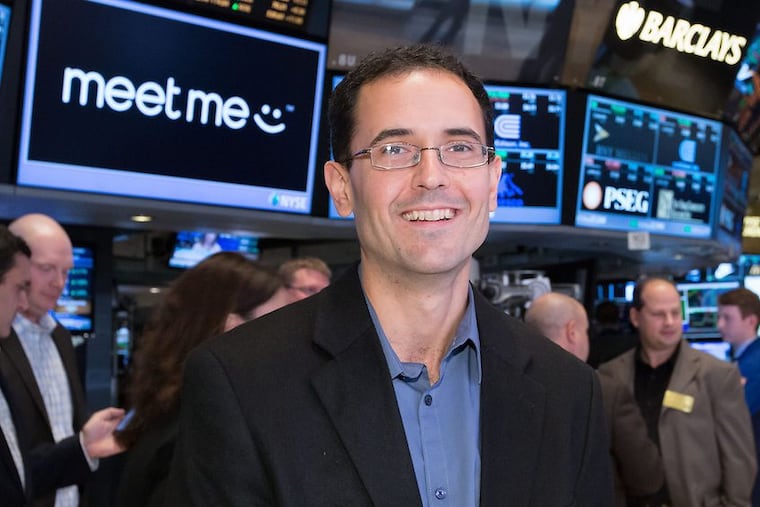New Hope’s Meet Group buys another dating app for $13.8 million
Meet Group, the New Hope social-media company that turned profitable last year after it began offering smartphone-video messaging, says it has acquired Growlr, “a leading same-sex social mobile application” based in Columbus, Ohio.

Meet Group, the New Hope social-media company that turned profitable last year after it began offering smartphone-video messaging, says it has acquired Growlr, “a leading same-sex social mobile application” based in Seattle.
Meet says it paid $11.8 million — $4 million in cash, $7 million from its bankers — and pledged $2 million more over the next two years if Growlr brings in expected additional sales.
Geoff Cook, who cofounded Meet as MyYearbook.com in 2005 and led the firm through a series of U.S. and foreign investments, called the deal “a meaningful step into the large same-sex dating market.”
“It allows us to be one of the first people to bring live streaming video to same-sex dating the same way of what we have already done in bringing live streaming to straight dating,” Cook said in an interview.
Cook added that the key asset from Growlr is the company’s high user engagement from its 20,000 global daily active users sending millions of chats each day. He expects Growlr to help Meet reach new users, especially for its live video products. Founded in 2009, Growlr expects 2019 revenues of $5.3 million.
The market for dating services in the U.S. has grown nearly 12 percent over the last five years to reach $3 billion in 2018, according to market researcher IBISWorld.
Cook does not see any direct competitors in the fast-growing social-media dating market. Big dating companies, such as Tinder and Bumble, have been “constrained by their inability to make video work and their social graphics is largely locked down behind the swipes," Cook said.
Though there are live-streaming platforms, such as Amazon’s Twitch, it’s largely for video games, different from Meet’s focus on helping people meet each other. Facebook and Instagram’s live streaming also are more for people who already know each other, he said.
Meet currently has more than 900,000 users, with at least 20 percent actively using video dating every day, according to Cook.
“The key is how do you get 80 percent to meet new people. We think we can get them in with a combination of interactive dating games and new video formats, like one-on-one live streaming and group video [streaming]” Cook added.
Meet reported 2018 sales totaled $179 million, up 44 percent from 2017, and earnings (before interest, taxes, depreciation/amortization, or EBITDA) were nearly flat at $32 million. Fourth-quarter sales were up more modestly.
Meet’s sales remain a fraction of social media giants, such as Facebook.
“Our goal is to build the best place to meet new people through video, and in the fourth quarter, we grew both the number of viewers and the number of broadcasters on our video platform from the third quarter of 2018," Cook said in a statement. He added that the firm collects an average of 18 cents “per active daily video user” from advertisers last fall, up from 14 cents in the third quarter, and has seen higher sales so far this year.
The company projects sales will rise to at least $210 million for all of 2019, including $47.8 million in the first quarter, with EBITDA topping $39 million for the year.
“We expect to roughly double video revenue from 2019 levels by 2021,” James Bugden, Meet Group’s chief financial officer, told analysts on a call Wednesday. “We expect the majority of our revenue will come from video beginning in 2021.”
Meet shares plunged on Wednesday, down by 7.74%, and closed at $5.48. The company’s shares briefly topped $6 last week, for the first time since 2017.